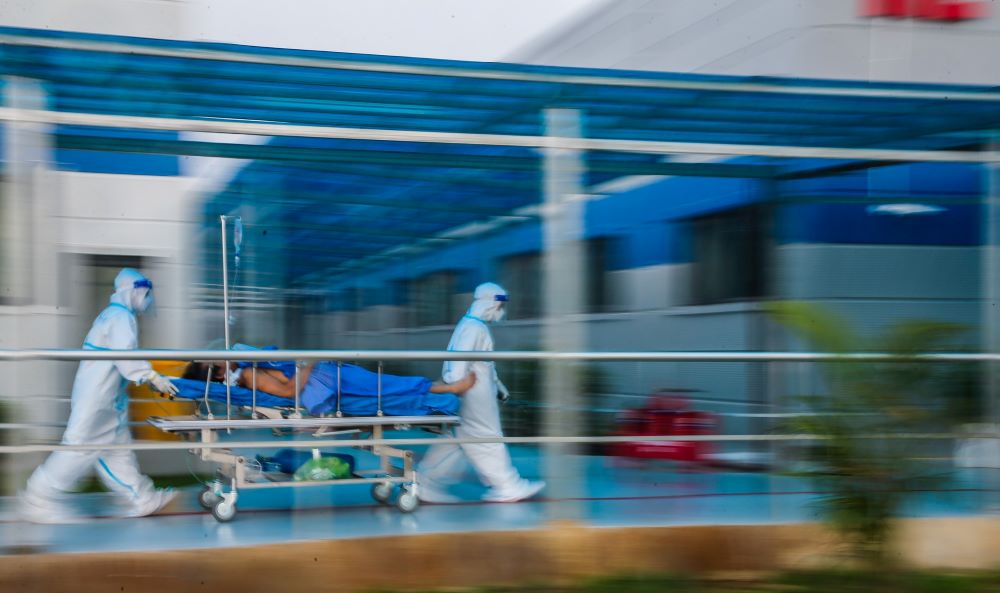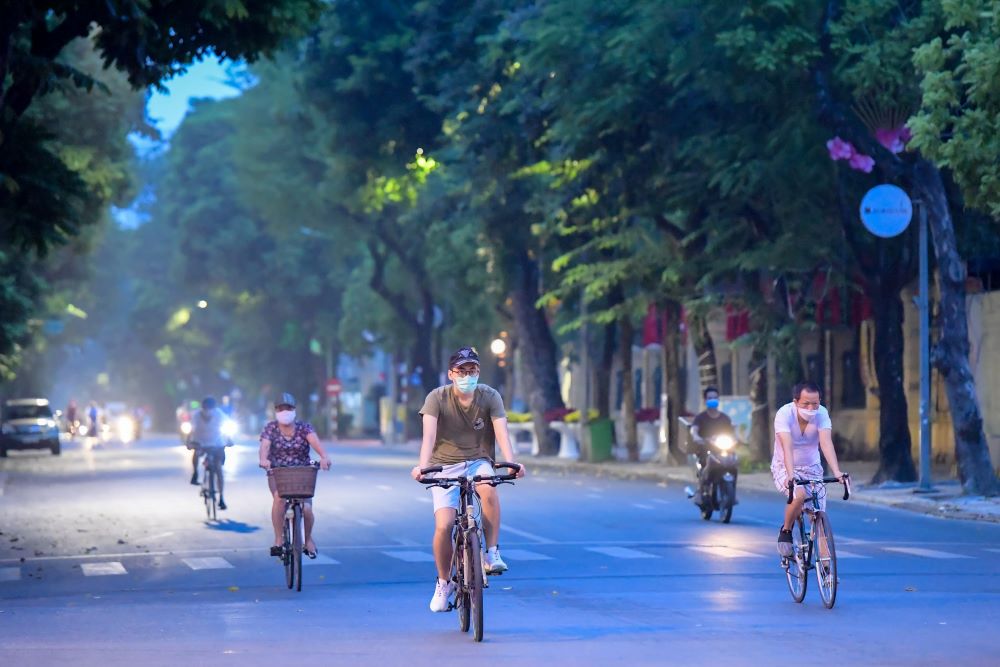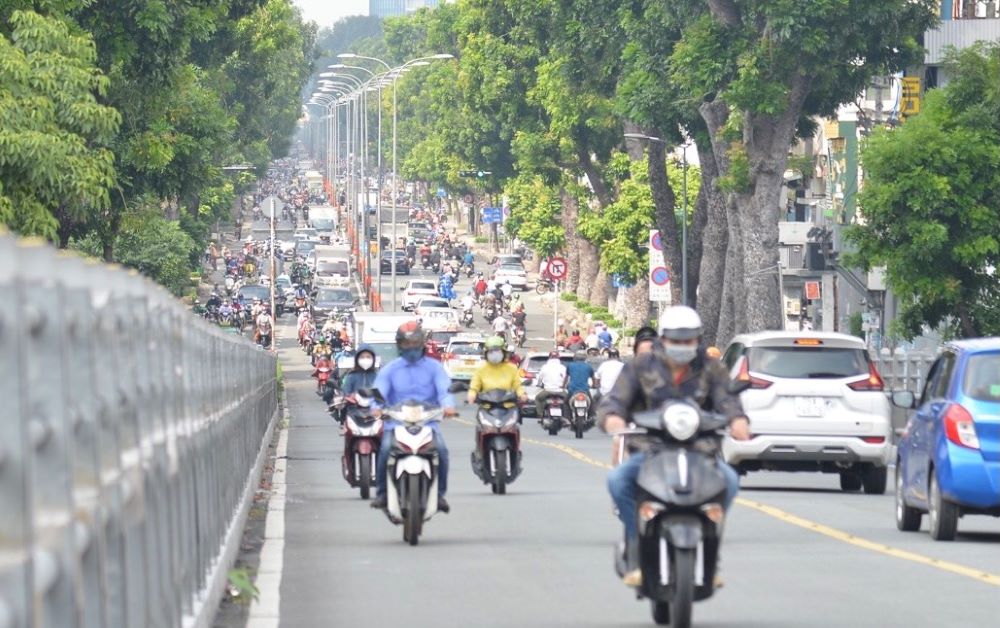The latest chapter in Vietnam’s valiant battle against the Delta variant
The good news is that most Vietnamese and expats are beginning to bask in the light at the end of tunnel.
Known the world over as a bustling country filled with optimistic and hard-working people, Vietnam suddenly became an eerily quiet and serene place after the fourth wave of Covid-19 crashed on its shores. The country and its people were confronted with the most acute public health crisis since the end of the US war in 1975. Ho Chi Minh City (HCMC) and neighboring provinces remain the epicenter of the fourth wave with the lion’s share of infections and deaths to date, most of which have occurred since last spring.
| Mark A. Ashwill, Managing Director and Co-founder of Capstone Vietnam |
The good news is that most Vietnamese and ex-pats are beginning to bask in the light at the end of the tunnel. As of November 12, there was a cumulative nationwide total of more than one million confirmed cases, of whom 858,211 (85%) patients have recovered, and nearly 23,000 deaths, according to the Vietnam Ministry of Health.
While these numbers pale in comparison to countries like Brazil, Canada, India, Italy, the US, and Russia, the concern from the outset was to contain the virus, a goal that Vietnam achieved, and now to create immunity through mass vaccinations, because of population density and the nation’s fragile healthcare system.
Streets and neighborhoods in which Covid-infected people resided were cordoned off. Since they were isolated, food and other supplies were delivered to them. The Vietnamese mobilized its military to assist with enforcing the curfew in HCMC and delivering supplies to people in affected areas. In addition, medical personnel from the North were assigned to the South to meet the steadily rising demand for patient care.
I live on the outskirts of Hanoi in a neighboring province and was only able to enter the city if I had a valid reason, e.g., a doctor’s appointment. Many people were requested to have a quick Covid-19 test performed at one of the checkpoints set up between my community and the city. A negative result would allow that person to travel back and forth for three days before having to take another test.
Although most people couldn’t venture far from home, they were out in the late afternoon and early evening exercising as the sun sank lower on the horizon and cooler temperatures prevailed, walking, jogging, and riding their bikes, all wearing masks without complaint.
As I wrote over the summer after an authorized drive through my adopted hometown in Hà Nội in the Fourth Wave.
Hà Nội, City of Peace, you have faced far worse in your millennia-long history – famine, war, poverty.
Lead the way!
To the life we knew and fervently dream of in the stifling time of COVID
Noisy, bustling, communal, productive
Imperfect yet satisfyingly normal.
My hopeful prediction came true just six weeks later.
| Health workers are racing against time to save lives at Hanoi’s biggest Covid-19 hospital. Photo: Khanh Huy/ The Hanoi Times |
As it did with the initial arrival of Covid-19 on January 23, 2020, Vietnam reacted quickly to the spike in new cases in late spring 2021 that heralded the fourth and most dangerous wave of the virus. Following the path taken by other countries, the game-changer in the latest battle against the coronavirus was the Delta variant.
This mutation of the original Covid-19 virus is twice as contagious as previous variants and may cause more severe illness than previous strains. In two studies in Canada and Scotland, patients infected with the Delta variant were more likely to be hospitalized than those with Alpha or the original virus strain.
In other words, while the government and most citizens and ex-pats did a yeoman’s job of containing Covid-19 since Day One (January 23, 2020), which enabled life to go on, as usual, the clock was always ticking. Vietnam had to obtain enough vaccines to begin inoculating people en masse, which proved to be a tall order. The lack of supply, one of many vexing North-South issues, combined with the highly contagious nature of the Delta variant, are two of the factors that have resulted in a record number of infections with a linear scale that pointed straight up for a time.
| Hanoians are doing exercises after restrictions, September 2021. Photo: Khanh Huy/ The Hanoi Times |
Vietnam’s vaccination program got off to a late start on March 8, 2021. The following vaccines have been approved for use: Janssen, Moderna, Pfizer-BioNTech, Oxford-AstraZeneca, Sinopharm, Sputnik V, India’s Covaxin, Cuba’s homegrown Abdala, and Hayat-Vax, a Chinese vaccine packaged in the UAE. The goal is to vaccinate 80% of the population of nearly 100 million by June 2022. Vietnam is also well on its way to becoming a producer of Russia’s Sputnik V vaccine.
The government also launched a $1.1 billion Vietnam Fund for Vaccination and Prevention of Coronavirus Disease to obtain 120 million vaccine doses by the end of 2021. The Vietnam Fund, which had raised $388 million, as of November 13, is in addition to state-earmarked funds of $791 million, meaning that Vietnam now has enough money to purchase vaccines needed to inoculate 75 million people or 77% of its population.
Hanoi has already vaccinated around 98% of all adults, accounting for 70% of the total city with at least one Covid-19 vaccine shot. Nearly 50% have been fully vaccinated. The government expects to have a total of 200 million doses available by the end of this year. Earlier in October, the Ministry of Health has authorized the use of Covid-19 vaccines for children aged 12 to 17 and so far, some big cities like HCMC have vaccinated 16-17-year-old children.
Aside from humanitarian reasons, foreign governments and companies have donated hundreds of thousands or millions of doses of vaccines for pragmatic reasons.
Another self-interested reason for the donations is that Vietnam’s economy plays a key role in the global supply chain ranging from several components for Apple’s new iPhone 13 to Nike shoes. The only way factories and other businesses will open are if more people are vaccinated.
In spite of the economic damage inflicted by the fourth wave of Covid-19, Vietnam’s GDP as an aggregate measure of economic activity is predicted to grow by 3.8% this year, the highest rate among the five major Southeast Asian economies that comprise ASEAN, which also includes Indonesia, Malaysia, the Philippines, and Thailand.
Last year, Vietnam recorded a 2.9% growth rate while the other four countries experienced negative growth. This is a credit to Vietnam’s ability to contain the coronavirus during the first three waves.
| Ho Chi Minh City's streets bustled again on Oct 1, the first day after months of restrictions. Photo: VNA |
Vietnam rises to the challenge – again
During the summer lockdown in Hanoi, I was inspired, in a manner of speaking, to write a ditty about the fourth wave entitled Got the COVID Blues. In its own way, it tells the story of Vietnam’s experience with this pandemic from containment to a new and hopeful reality of living with COVID until the vaccination program has run its course.
Got the COVID Blues I'm workin' from home in my gilded cage Dreamin' of travel in the post-COVID age Coronavirus on the hunt again Lookin’ for victims wherever it can I've got the COVID blues, don’t you know what I mean I’ve got the COVID blues, Lord, have mercy on me Viet Nam, it did a bang-up job Of kicking COVID’s ass from Hanoi to Saigon But Delta Vari is back for more Don’t give up ‘cause we’re still in a war I've got the COVID blues, don’t you know what I mean I’ve got the COVID blues, Lord, have mercy on me The city's locked down, we're doing all we can To stop the spread of this goddamn plague Dreamin’ of the jab and the freedom it brings Hope for better days when we're back again I’ve got the COVID blues, don’t you know what I mean I’ve got the COVID blues, Lord, have mercy on me The vaccination is our only hope Moderna, Astra, Pfizer get us off the ropes We’re countin’ on you to make us safe again ‘Cause we know in our hearts that it’s the only way I've got the COVID blues, don’t you know what I mean I’ve got the COVID blues, Lord, have mercy on me The night is dark, but the dawn is bright We’ve gotta stay strong and do what’s right It’s almost over, just around the bend COVID-19’s about to meet its end We’ve got the COVID blues, don’t you know what I mean We’ve got the Cô Vy blues, Lord, have mercy on me You know what we need… |
The only way out, the golden bridge between a highly contagious virus that is infecting thousands every day and a return to normality, is a mass vaccination program in which a high percentage of the nation’s citizens are vaccinated. This future success story will resolve three important issues in one fell swoop: personal safety, economic recovery, and continued political stability.
One delightful result of the return to relative normality is an explosion of wedding parties. The owner of a wedding planning company in Hanoi exclaimed, “It feels like the whole of Hanoi is getting married on October 15 and 24.” It’s a release of pent-up demand but also an illustration of the idiom, “Strike while the iron is hot,” not knowing if further restrictions will be necessary.
Since the August 2021 take-off phase of vaccinations, the Vietnamese people and the relatively few ex-pats who call Vietnam home are getting exactly what they need. While the fat lady has yet to sing, Vietnam has so far risen to the challenge of the fourth wave with its usual perseverance and determination.
Mark A. Ashwill has lived in Vietnam since 2005. He is managing director and co-founder of Capstone Vietnam, a full-service educational consulting company with offices in Hanoi and HCMC.

.jpg)













